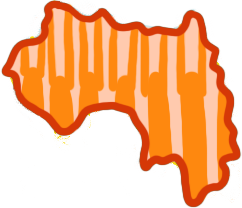Text
In this chapter, we are going to cover orders and commands or what linguists call imperatives.
Specifically, I'll cover the following:
- Positive singular imperatives (e.g., "Go!" or "Greet them!")
- Negative singular imperatives (e.g., "Don't go!" or "Don't greet them!")
- Plural imperatives
Positive singular imperatives
Expressing an order is very straightforward. The verb itself will undergo no change at all.
If the verb is intransitive (that is, without a direct object) and you want to use it in an imperative, you simply say the verb just like in English.
For instance, if you were a bit frustrated with someone, perhaps a small child who had broken something in your courtyard while you were serving in the Peace Corps, you might say:
Taa!
'Go!'
Or, if you ran into a trouble during a night on the town and you needed to get away quickly, you might say to a friend:
Bori!
'Run!'
On the other hand, if the verb is transitive (that is, with a direct object), the verb remains unchanged, but you place the direct object before the verb (just like you would in a typical Manding sentence like we saw in the chapter on "Verbs in the Present", etc).
For instance, you might instruct a kid to be polite by saying:
Karamɔɔ fo!
teacher greet'Greet the elderman!'
Or if you realize how helpless you are while learning a new language and navigating a new culture, you might say:
N dɛmɛn!
me help'Help me!'
Negative singular imperatives
To make the sentences like those above negative, you simply need to add one word: the negative imperative or "prohibitive" predicate marker kana, which goes at the beginning of the sentence. For example:
Kana taa!
DON'T go"Don't go!"
Or, if I wanted to encourage you to get better at Bambara, I might say:
Kana tubabukan fɔ!
DON'T French speak"Don't speak French"
To multiple people
When addressing multiple people, things get slightly more complicated. The verb remains unchanged, but we need to add two words to the beginning of our order: álu, the second person plural pronoun meaning 'you all', and ye, which is the plural imperative predicate marker (IMP). For instance:
Álu ye taa!
you.all IMP go'Go!' ( to multiple people)
If our sentence is transitive, we follow the same pattern; we simply add Álu ye to the beginning. For instance, if you were addressing a gathering of people who regularly denied basic truths and threatened the foundation of your democracy, you might say:
Álu ye tuɲa fɔ!
you.all IMP truth say'Say the truth!' (to multiple people)
If, on the other hand, you'd like to use a negative imperative with multiple people then there is no special form; you simply use kana exactly like you do in an order or command to one person. For instance:
Kana taa!
"Don't go!" (to one or multiple people)
Or, if you were addressing the loony people from before, you could say:
Kana manamanakan fɔ!
DON'T nonsense say'Don't say nonsense!'' (to one or multiple people)
Summary
Ayiwa! In this chapter, we covered the following:
-
To address an imperative to one person, there is no need to change the verb:
Taa!
'Go!'
-
If a singular imperative is transitive, the direct object appears before the verb just like in normal Maninka sentences:
Bon fɛlɛ!
'Look at the house!'
-
If a singular imperative is negative, we simply place the negative marker
kanaat the beginning of the sentence:Kana taa!
"Don't go!"Kana so filɛ!
"Don't look at the house!" -
When addressing multiple people, affirmative imperatives require that we put
Álu yeat the beginning of the sentence:Álu ye taa!
'Go!' (to multiple people)Álu ye bon fɛlɛ!
'Look at the house!' -
To make plural imperatives, negative there is no special form; you use
kanain the same way you would when addressing one person:Kana taa!
"Don't go!" (to one or multiple people)Kana bon fɛlɛ!
"Don't look at the house!" (to one or multiple people)
Vocab
Coming soon n'Ala sɔnna!
- Taa!
- Go!
- Kana X!
- Don't X!
- Álu ye taa!
- Go! (to multiple people)
- Kana taa!
- Don't go!
- À fɛlɛ!
- Look at it!
- Kan'à fɛlɛ!
- Don't look at it!
- Álu ye à fɛlɛ!
- Look at it! (to multiple people)
- Kana o fɔ!
- Don't say that!
- Nin lamɛn!
- Listen to this!
- N dɛmɛn!
- Help me!
- Bɔ yan!
- Get out of here! (lit. 'Exit here!')
- manamanakan
- nonsense; blabber
- ka wuya fɔ
- to tell a lie/fibbery
- ka tuɲa fɔ
- to tell the truth (lit. 'to speak the truth')
- ka bori
- to run; to flee
- k'à bori
- to drive/ride something
- I sii!
- Sit down (lit. 'Sit yourself')!
- ka to
- to remain; to stay
- k'à to
- to leave something/someone
- ka kasi
- to cry
- ka yafa mɔɔ ma
- to forgive someone
- Yafa n ma!
- Forgive me!
- Sabari!
- Have patience! (as in, 'Be forgiving!' or "Come on!")
- Sabali!
- Have patience! [Bambara]
- nka
- but [Bambara]
- konin
- but [Maninka]
- k'à (ma)ɲininka
- to ask someone
- ka mɔɔ ɲininka fen na
- to ask someone about something
Vocab list will be here someday!
Flashcards will be here someday!
Exercises
Exercises will be here someday!




